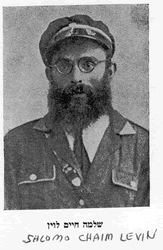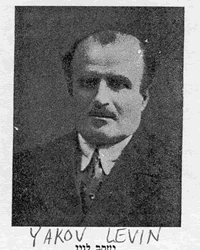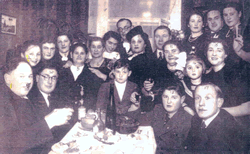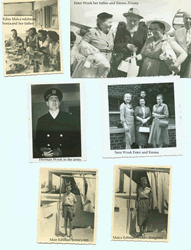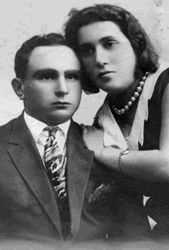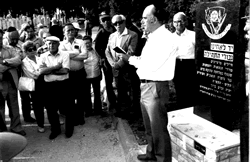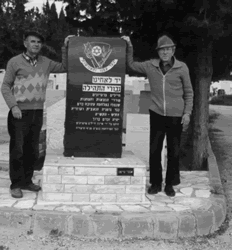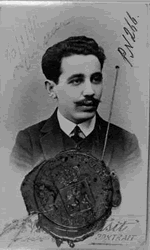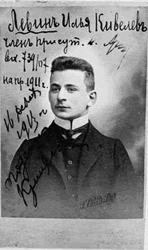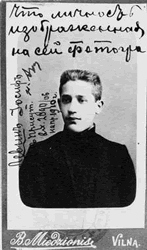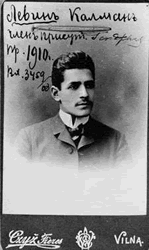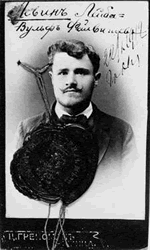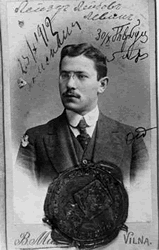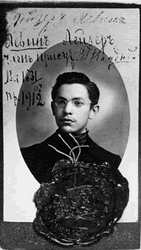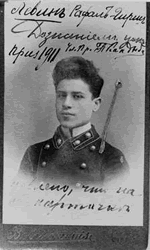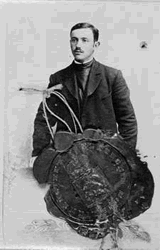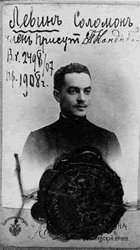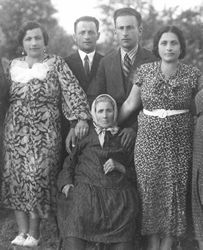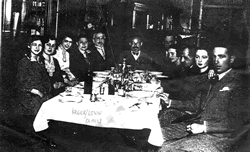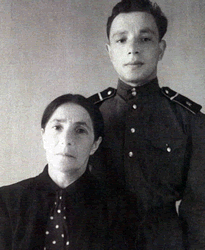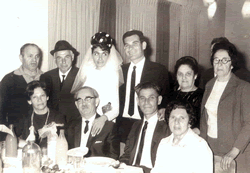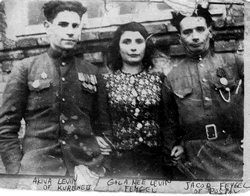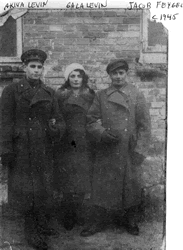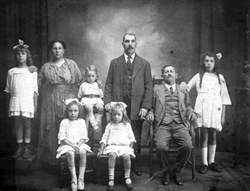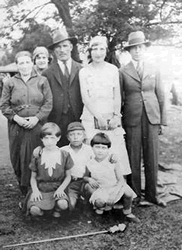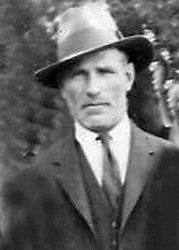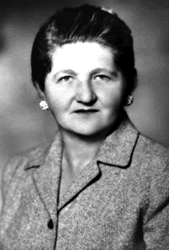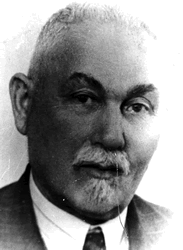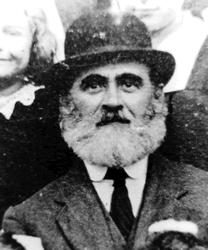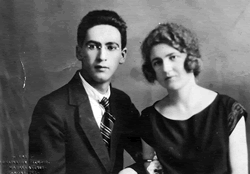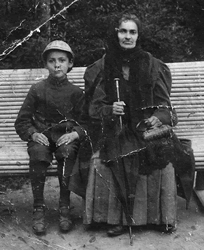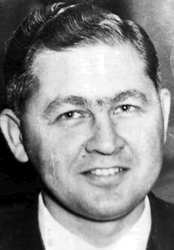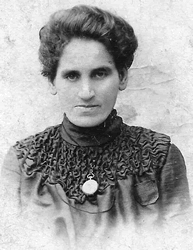#lvn-24:
Nathan Jack Levin, Eva Fleiser, Tilly (Taube) Levin, Anne Blank, Netty Sacks, Minnie Sartov, Zalman "Solomon" Levin
#lvn-25:
Rae Ogin, Shmuel Leib Levin, Etel Dina Levin, Abe Levin, Pearl Goldstein, Archie "Aaron" Levin, Bessie Levin
#lvn-26:
Samuel Levin
#lvn-27:
Betty Behr – my mother
#lvn-28:
Dov Ber Levin
#lvn-29:
Hirsche Leib Behr (my paternal grandfather)
#lvn-30:
Jack and Betty Behr (my parents)
#lvn-31:
Jack Behr and his mother Leah Breine (nee Jacoby)
#lvn-32:
Dr. Joe Levin ( in 2015 he is 101 years old)
#lvn-33:
Mere Harris
LEVIN, HIRSCHEL BEN ARYEH LÖB  Â
By : Solomon Schechter  M. Seligsohn Â
German rabbi; born at Rzeszow, Galicia, in 1721; died at Berlin Aug. 26, 1800. His father (known also as Saul Levin) was rabbi at Amsterdam; and on his mother's side Hirschel was a nephew of JacobEmden. Although he occupied himself also with secular sciences and philosophy, Levin paid special attention to Hebrew grammar and literature, and composed several Hebrew poems. Levin was a distinguished Talmudist, and in 1751, when he was only thirty years old, he threw himself into the struggle between Emden and EybeschÃ14tz, naturally siding with the former. His epistles against EybeschÃ14tz made such an impression that in 1756 he was elected chief rabbi of the London congregation of German and Polish Jews. In 1760 Jacob ?im?i having published at Altona a responsum in which he charged the London butchers ("sho?e?im") with negligence in regard to their duties, Levin warmly defended them. The wardens of his synagogue, however, refused him permission to make a public reply to ?im?i's charges; he therefore resigned in 1763, and accepted the rabbinate of Halberstadt. It would appear, from the letter in which the community of Halberstadt offered him the rabbinate, that Levin's resignation was occasioned by the neglect of Biblical and Talmudic studies by the Jews of London. He afterward became rabbi of Mannheim; and in 1772 he was appointed chief rabbi of Berlin. He was a great friend of Mendelssohn.
(see image) Hirschel Levin.In 1778 Levin gave his approbation to Mendelssohn's German translation of the Pentateuch. In the preceding year the Prussian government had ordered Levin to make a résumé in German of the Jewish civil laws, such as those on inheritance, guardianship, and marriage, and to present it to the royal department of justice. Levin, not having a thorough knowledge of the German language, applied to Mendelssohn to do the work. Mendelssohn, accordingly, wrote his "Ritualgesetze der Juden," printed under Levin's superintendence, 1778.Despite his toleration and enlightenment, Levin, instigated by the rabbis of Glogau and Lissa, began in 1782 to persecute Naphtali Herz Wessely for his "Dibre Shalom we-Emet" (Landshuth, "Toledot Anshe ha-Shem," p. 85; Kayserling, "Mendelssohn," p. 307). He prohibited the printing of that work, and insisted upon the expulsion of the author from Berlin. But Wessely's friends prevailed on Levin to desist from attacking Wessely, while Mendelssohn at the same time gave Levin to understand that the press in Germany was free to everybody.Levin wrote: Epistles against EybeschÃ14tz, printed by one of Emden's pupils, in the "Sefat Emet u-Leshon Zehorit," Altona, 1752; glosses on Pir?e Abot, printed with Emden's commentary to Pir?e Abot, Berlin, 1834; notes to the "Sefer Yu?asin" and "Sefer ha-?innuk," some of which were published in Kobak's "Jeschurun." Some of his poetry was published in "Ha-Maggid" (xiv.) under the title "Na?alat ?ebi." Finally, three manuscript volumes of his responsa are to be found in the library of the London Bet ha-Midrash, bearing the numbers 24 to 26.
Bibliography: GrðËtz, Gesch. 2d ed., xi. 41, 89, 151;
H. Adler, in Publ. Anglo-Jew. Hist. Exhibition, 1887, pp. 280 et seq.;
Landshuth, Toledot Anshe ha-Shem, pp. 72-78;
Kayserling, Moses Mendelssohn, pp. 282, 291, 311;
Auerbach, Gesch. der Israelitischen Gemeinde Halberstadt, pp. 89 et seq., Halberstadt, 1866;
Fuenn, Keneset Yisrael, p. 284.S. S. M. Sel.
LEVIN, EMANUEL BORISOVICH:Â Â Â
By : Herman Rosenthal  S. M. Goldstein Â
Russian teacher and communal worker; born at Minsk Dec. 15, 1820; educated
at the Molodechensk school for the nobility (1836-41). He taught in G.
Klaczko's private school at Wilna from 1842 to 1844, and at the public
schools of Minsk from 1846 to 1851. Having passed his examinations in
1848, he received an appointment in the Jewish government school at Proskurov,
Podolia (1851-52), and subsequently in the rabbinical school at Jitomir
(1853-57).
In 1859 Levin settled in St. Petersburg, where he became one of the first
members of the Society for the Promotion of Culture Among the Jews of
Russia, of which he acted as secretary until 1872, when he became an honorary
member. Since 1895 Levin has been a member of the historical committee
of the society and one of the collaborators of the "Regesty i Nadpisi."
Levin was elected a member of the Imperial Russian Geographical Society
in 1870; and he is also a member of the Society for the Promotion of Commerce
and Industry. In 1895 Levin was made an honorary citizen by the Russian
government for his "Code of Laws Concerning the Jews."
Levin's other works include: a Russian grammar in Hebrew, Wilna, 1846;
"Moiseyevo Brachnoye Pravo," St. Petersburg, 1875, on the marriage
laws according to the Talmud and the rabbinical literature, translated
from Hebrew sources; "Svod Uzakoneni o Yevreyakh, ib. 1885; "Perechen
Ogranichitelnykh Zakonov o Yevreyakh v Yevreyakh o Rossii" (ib. 1890),
both on the disabilities of the Jews in Russia; "Sboraik Ogranichitelnikh
Zakonov o Yevreyakh," ib. 1902, on the same subject. He published
also the text of the Pir?e Abot with Russian translation and notes, ib.
1868.H. R. S. M. G.
LEVIN, JOSHUA HöSCHEL BEN ELIJAH ZEEB:   (print
this article)Â Â Â
By : Solomon Schechter  M. Seligsohn Â
Lithuanian Talmudist and author; born at Wilna July 22, 1818; died at
Paris Nov. 15, 1883. After studying Talmud and rabbinics under Elijah
Kalischer, Levin settled in Volozhin, where he lectured on Talmud and
wrote several works. In 1871 he was called to the rabbinate of Praga,
near Warsaw. Toward the end of his life Levin went to Paris with the intention
of proceeding thence to the Holy Land; but at the request of Israel Salant
he remained in the French capital and became preacher for the Russo-Polish
community there.Levin was the author of many works, of which the following
have been published at Wilna: "Haggahot," notes on the Midrash
Rabbah; "'Aliyyot Eliyahu" (1856), a biography of Elijah Wilna;
"Ma'yene Yehoshua'," a commentary on Pir?e Abot, printed in
the "Rua? ?ayyim" of ?ayyim Volozhin (1859); "?iyyun Yehoshua'"
(1859), a complete concordance to both Talmuds; "Tosefot Sheni le-?iyyon,"
glosses to the Mishnah; "Pele?at Soferim" (1863), novellÃώ
and essays; "Dabar be-'Itto" (1878), discussions and explanations
on halakic matters.
Bibliography: Univ. Isr. xxxix. 156;
Ha-Meli?, 1883, col. 1423;
Ha-Asif, i., section 1, p. 141.S. S. M. Sel.
GOLDSCHMIDT, LEVIN:Â Â Â (print this
article)Â Â Â
By : Isidore Singer  Max Cohen Â
German jurist; born at Danzig May 30, 1829; died at Wilhelmshöhe
July 16, 1897. From 1847 to 1851 he pursued his studies at the universities
of Berlin, Bonn, and Heidelberg, receiving his doctor's degree in 1851
from the University of Halle. He practised for several years in the courts
of Danzig, became privat-docent at the University of Heidelberg in 1855,
and was appointed associate professor in 1860. In the years 1857-60 he
published "Kritik des Entwurfs eines Handelsgesetzbuchs fÃ14r
die Preussischen Staaten" and "Gutachten Ã14ber den
Entwurf eines Deutschen Handelsgesetzbuchs nach den BeschlÃ14ssen
Zweiter Lesung," which at once attracted attention to him as a critical
jurist. During the same period he published "Der Lucca-Pistoja-Aktienstreit,"
Frankfort-on-the-Main, 1859 (Supplement, 1861). He is the founder (1858)
of the "Zeitschrift fÃ14r das Gesammte Handelsrecht."
(see image) Levin Goldschmidt.Goldschmidt's scholarship was next displayed
in his "EncyclopðËdie der Rechtswissenschaft im
Grundriss," Heidelberg, 1862. He then began the greatwork which occupied
him during the remainder of his lifetime, but which he did not live to
complete, namely, "Das Handbuch des Handelsrechts," Erlangen,
1864-68. This is the work with which his fame as a historical jurist is
identified, it being recognized as a masterly presentation of the general
history of commercial law.In 1866 Goldschmidt was promoted to a professorship
in the juridical faculty at Heidelberg. He next received the appointment
of "Justizrat" in the Bundesgericht at Leipsic, afterward occupying
a judicial position at the Reichsoberhandelsgericht. In 1875 he became
professor of commercial law in Berlin University, and received the title
"Geheimer Justizrat." From 1875 to 1877 he was also a member
of the German Reichstag, representing the city of Leipsic.Of his further
publications the following deserve special mention: "Das DreijðËhrige
Studium der Rechts- und Staatswissenschaften," Berlin, 1878; "Erwerbs-
und Wirtschaftsgenossenschaften, Studien und VorschlðËge,"
Stuttgart, 1882; "Rechtsstudium und PrÃ14fungsordnung,"
ib. 1887; "Die Haftpflicht der Genossen und das Umlageverfahren,"
Berlin, 1888; "System des Handelsrechts," Stuttgart, 1887, 4th
ed., 1891.
Bibliography: Riesser, GedðËchtnissrede, Berlin, 1897
(with portrait);
Pappenheim, Nachruf, in Zeitschrift fÃ14r Handelsrecht, xlvii.;
Deutsche Juristenzeitung, ii., No. 15;
Adler, Levin Goldschmidt, in Bettelheim, Biographisches Jahrbuch, ii.
119-122.S. M. Co.LEVIN, JUDAH LÖB (JEHALEL):   (print
this article)Â Â Â
By : Herman Rosenthal  J. G. Lipman Â
Hebrew poet; born at Minsk,
Russia, 1845. He studied Talmud under Rabbi ?ayyim Selig and other prominent
rabbis. At the age of sixteen he read through the entire Talmud. He was
then married tothe daughter of a ?asid; and under the influence of his
new surroundings he began the study of the Zohar and other mystical literature.
In 1868 he went to Kiev as teacher in the house of Lazar Brodski, where
he studied German and Russian. He was also made treasurer of the Brodski
flour-mills. In 1887 he was appointed treasurer of the Brodski sugar-refinery
in Tomashpol, Podolia, where he is now (1904) residing.Levin began to
write Hebrew poetry at the age of ten; and he has contributed extensively
during the last thirty years to the Hebrew periodicals "Ha-Meli?,"
"Ha-?efirah," "Ha-Maggid," "Ha-Asif," and
"Ha-Sha?ar." His first collection of verse, entitled "Sifte
Renanim" (Jitomir, 1871), contains mostly occasional poems. In 1877
his "Kishron ha-Ma'aseh" appeared, first in "Ha-Sha?ar"
(vols. vii., xviii.), and then in book form. It contains four large poems
throwing light on the social condition of the Jews of Russia. They are
socialistic in tendency. In another volume of "Ha-Sha?ar" (lxxx.)
he published "El?anan," an epic poem in three parts, also concerning
the social condition of the Russian Jews. Levin's style is affected and
lacks brilliancy. In 1883 he translated Disraeli's "Tancred"
into Hebrew under the title "Nes la-Goyim." The translation
was much criticized by Frischman in "'Al ha-Nes," Warsaw, 1883.
Bibliography: Zeitlin, Bibl. Post-Mendels.;
Lippe, Bibliographisches Lexicon;
Klausner, Novo-Yevreiskaya Literatura;
Frischman, Tohu wa-Bohu, Warsaw, 1883.H. R. J. G. L.
LEVIN, MENDELÂ Â Â (print this article)Â Â Â
By : Herman Rosenthal  Peter Wiernik Â
Polish scholar and author; born in Satanow, Podolia, about 1741; died
in Mikolayev, in the same province, 1819. He was educated for a Talmudist,
but became interested in secular studies after reading J. S. Delmedigo's
"Elim," which opened for him the hitherto unknown world of science.
He went to Berlin, and there, being attracted by the brilliant circle
of Jewish scholars of which Moses Mendelssohn was the central figure,
he remained for several years. From Berlin he went to Brody, where he
exerted much influence over Perl, Krochmal, and other early representatives
of the Haskalah in Galicia. Later he lived in the palatial home of Joshua
Zeitlin in Ustye, government of Moghilef, at the same time that Baruch
ben Jacob resided there. He removed thence to Mikolayev, which belonged
to the estate of Prince Adam Czartoryski, who engaged him as teacher for
his children. M. Letteris saw an essay on Kant's philosophy written by
Mendel in French for Czartoryski.Levin's works are: "Moda' la-Binah,"
with an approbation by Mendelssohn (Berlin, 1789); "Refu'ot ha-'Am"
(Zolkiev, 1794; 2d ed. Lemberg, 1851), popular medicine translated from
the French by Tisot; "?eshbon ha-Nefesh" (Lemberg, 1809; Wilna,
1844; Warsaw, 1852), practical ethics, after Franklin; "Masse'ot
ha-Yam" (Zolkiev, 1818), travels on the sea, after Campe. His paraphrase
of Tibbon's translation of the "Moreh Nebukim" in popular rabbinical
Hebrew was published by M. Suchastover (Zolkiev, 1829), and his introduction
to that work, entitled "Elon Moreh," by H. S. Slonimski (Odessa,
1867). Mendel was also the author of a Yiddish translation of Proverbs
(Tarnopol, 1816), which innovation called forth a satirical work against
him by Tobiah Feder ("?ol Me?a?e?im," Berdychev, 1816). He translated
also Ecclesiastes into the same dialect; but the work was not published
till long after his death (Odessa, 1873).
Bibliography: Fuenn, ?iryah Ne'emanah, pp. 277-278, Wilna, 1860;
idem, Safah le-Ne'emanim, p. 140, Wilna, 1881;
Ha-Meassef (Letteris ed., 1862), i. 96-97;
Stanislavski, Mendel Levin, in Voskhod, 1881, No. 3, pp. 116-127;
Zeitlin, Bibl. Post-Mendels. pp. 202-204.H. R. P. Wi.
LEVIN, MORITZ:Â Â Â (print this article)Â Â Â
By : Isidore Singer  German rabbi; born 1843
at Wongrowitz, Posen. He studied at the University of Berlin, and was
prepared for his rabbinical career by private teachers. After officiating
as rabbi for a short time at Zurich, he went in 1872 in a similar capacity
to Nuremberg. Since 1884 he has been preacher of the Reform congregation
in Berlin.Levin is the author of: "Gott und Seele nach JÃ14discher
Lehre," Zurich, 1871; "Der Gottesdienst des Herzens. Israelitisches
Gebetbuch fÃ14r Oeffentliche und Privatandacht," 2 vols.,
1872; "Lehrbuch der Biblischen Geschichte und Literatur," 3d
ed., 1897; "Iberia," Berlin, 1892; "Bar Kochba," 1892
(2d ed., 1904); "Lehrbuch der JÃ14dischen Geschichte und
Literatur," 3d ed., 1900; "Die Israelitische Religionslehre,
Systematisch Dargestellt," 1892 (2d ed., 1900); "Die Reform
des Judentums. Festschrift zur Feier des 50-JðËhrigen
Bestehens der JÃ14dischen Reformgemeinde in Berlin," 1895.
S.
LEVIN, JACOB:Â Â Â (print this article)Â Â Â
By : Isidore Singer  M. Seligsohn Â
Galician Hebraist; born at Brody in 1844. In 1865 he became coeditor with
Werber on the Hebrew paper "'Ibri Anoki," in which he published
a series of articles on the position of the Jews in Russia before Alexander
II. In 1880 he produced a didactic poem entitled "Hitpatte?ut Tebel,"
on the evolution of religion and philosophy. Levin had previously translated
into Hebrew Schiller's "Die Braut von Messina" under the title
"Medanim Ben A?im" (Brody, 1868).
Bibliography: Sokolov, Sefer ha-Zikkaron, p. 63, Warsaw, 1889;
Zeitlin, Bibl. Post-Mendels. p. 202
LEVIN, ISRAEL SOLOMON:Â Â Â (print this
article)Â Â Â
By : Isidore Singer  Frank Cramer Â
Danish grammarian and linguist; born in Randers 1810; died in Copenhagen
1883. He graduated from Randers high school, and afterward was employed
as editor of a critical journal and as a translator of novels.Levin was
the author of several works on Danish grammar, notably "Dansk Lyd
og KjönslÃώre" (1844), and of two novels, "KrigsfortÃώllinger
for Menigmand" and "Nogle TrÃώk af Livet i Hamburg"
(1848).
Bibliography: C. F. Bricka, Dansk Biografisk Lexicon.S. F. C.
OLSCHWANG (LEVIN), JACOB SOLOMON:Â Â Â (print
this article)Â Â Â
By : Herman Rosenthal  A. S. Waldstein Â
Russian Hebraist; born at Kokhanovo, government of Moghilef, May 4, 1840;
died at Yekaterinoslav Jan. 17, 1896. He was a descendant of David Conforte,
the author of "Seder ha-Dorot." Olschwang received a thorough
?asidic education, and studied Talmud and Halakah, the Zohar and various
other cabalistic works. He then went to Kovno, where he studied at the
yeshibah of Navyazki. In 1862 he settled in Friedrichstadt, Courland,
where he joined the circle of the Maskilim and in a short time was able
to write Hebrew well. His family name was then Levin, which he changed
to Olschwang when he removed to Krementchug in 1866.Olschwang contributed
numerous articles to "Ha-Meli?" (from 1860), "Ha-Sha?ar,"
"Ha-Bo?er Or," and other Hebrew periodicals. The most interesting
of Olschwang's writings are "Abot de-Kartina" (in "Ha-Meli?,"
1868) and "Haggadah shel Pesa?" (in "Ha-Sha?ar," 1877),
both satirical sketches of Jewish life in Russia.Olschwang maintained
a correspondence with most of the Russian Maskilim of his time, especially
with Jacob Reiffmann, Lillienblum, Zederbaum, L. Schulman, Dobsevage,
and Rosenthal. Many of his articles were signed "YaShBaL."
Bibliography: Sefer Zikkaron, p. 203, Warsaw, 1889;
Lua? A?iasaf, iv. 304.H. R. A. S. W.
LEVIN (ROBERT), RAHEL ANTONIE FRIEDERIKE:Â Â Â (print
this article)Â Â Â
By : Isidore Singer  Frederick T. Haneman Â
German writer; born at Berlin June 19, 1771; died there March 7, 1833.
Her home life was uncongenial, her father, a wealthy jeweler, being a
strong-willed man and ruling his family despotically. She was very intimate
with Dorothea and Henriette, daughters of Moses Mendelssohn. Together
with them she knew Henriette Herz, with whom she later became most intimately
associated, moving in the same intellectual sphere. Rahel's home became
the meeting-place of men like Schlegel, Schelling, Steffens, Schack, Schleiermacher,
Alexander and Wilhelm von Humboldt, Lamotte-Fouqué, Baron
BrÃ14ckmann, Ludwig Tieck, Jean Paul Richter, and F. von Gentz.
During a visit to Carlsbad in 1795 she was introduced to Goethe, whom
she again saw in 1815, at Frankfort-on-the-Main.
(see image) Rahel Levin.After the death of her father in 1806 she lived
successively in Paris, Frankfort-on-the-Main, Hamburg, Prague, and Dresden.
This period was one of misfortune for Germany; Prussia was reduced to
a small kingdom and her king was in exile. Secret societies were formed
in every part of the country with the object of throwing off the tyranny
of Napoleon; Rahel herself belonged to one of these societies. In 1814
she married, in Berlin, Karl August Varnhagen von Ense (b. Feb. 21, 1785,
at DÃ14sseldorf; d. at Berlin Oct. 10, 1858), after having been
converted to Christianity. At the time of their marriage, Varnhagen, who
had fought in the Austrian army against the French, belonged to the Prussian
diplomatic corps, and their house at Vienna became the meeting-place of
the Prussian delegates to the Vienna Congress. She accompanied her husband
in 1815 to Vienna, and in 1816 to Carlsruhe, where he was Prussian representative.
After 1819 she again lived in Berlin, where Varnhagen had taken up his
residence after having been retired from his diplomatic position.Though
not a productive writer herself, Rahel was the center of a circle of eminent
writers, scholars, and artists in the Prussian capital. A few of her essays
appeared in print in "Das Morgenblatt," "Das Schweizerische
Museum," and "Der Gesellschafter," and in 1830 her "DenkblðËtter
einer Berlinerin" was published in Berlin. Her correspondence with
David Veit and with Varnhagen von Ense was published in Leipsic, in 1861
and 1874-75 respectively.Rahel always showed the greatest interest in
her former coreligionists, endeavoring by word and deed to better their
position, especially during the anti-Semitic outburst in Germany in 1819.
On the day of her funeral Varnhagen sent a considerable sum of money to
the Jewish poor of Berlin.The poet Ludwig Robert was a brother of Rahel,
and with him she corresponded extensively; her sister Rosa was married
to Karl Asser.
Bibliography: Schmidt-Weissenfels, Rahel und Ihre Zeit, Leipsic, 1857;
Mrs. Vaughan Jennings, Rahel, Her Life and Letters, London, 1876;
Assing, Aus Rahels Herzensleben, ib. 1877;
Kayserling, Dic JÃ14dischen Frauen, pp. 208 et seq., Leipsic,
1879;
Varnhagen, Rahel, ein Buch des Andenkens fÃ14r Ihre Freunde, Berlin,
1833;
idem, Galerie von Bildnissen aus Rahel's Umgang und Briefwechsel, Leipsic,
1836;
Berdrow, Rahel Varnhagen: Ein Lebens- und Zeitbild, Stuttgart, 1900.S.
F. T. H.
LEVIN, LEWIS CHARLES:Â Â Â (print this
article)Â Â Â
By : Cyrus Adler  Frederick T. Haneman Â
American politician and writer; born at Charleston, S. C., Nov. 10, 1808;
died in Philadelphia March 14, 1860. When still a youth he went to Woodville,
Miss., where he became a school-teacher and studied law. After having
been wounded in a duel he left that town and practised law successively
in Maryland, Kentucky, Louisiana, and Pennsylvania. In 1838 he settled
in Philadelphia and was there admitted to the bar. There he edited the
"Temperance Advocate," and soon became known as a writer and
speaker in the interest of the Temperance party. He was instrumental in
the formation of the Native American party in 1843, and founded in its
support in Philadelphia the "Sun," of which daily paper he became
the editor. In 1845 he was elected to Congress, retaining his seat until
1851. He became a member of several committees and was chairman of the
committee on naval affairs.
Bibliography: C. Adler, in American Jewish Year Book, 5661 (1900-1).A.
F. T. H.
BERLIN, SAULÂ Â Â (print this article)Â Â Â
By : Louis Ginzberg Â
ARTICLE HEADINGS:
  Ridicules Talmudic Science.
  Berlin's Character.
German Talmudist, and one of the most learned Jews of the Mendelssohnian
period; born (at Glogau?) 1740; died in London Nov. 16, 1794. He received
his general education principally from his father, who was chief rabbi
of Berlin, and one of the few rabbis of the time who combined Talmudic
learning with secular culture. Saul, the eldest son, was consequently
educated along the same lines. In Berlin and Breslau (whither the young
man frequently went to visit his father-in-law, R. Joseph Jonas FrðËnkel)
he came into personal contact with the representatives of the movement
for progress in Judaism, and became one of its most enthusiastic adherents.
His antecedents, education, and calling, as rabbi in Frankfort-on-the-Oder,
made it almost impossible for him openly to renounce the old rabbinism;
and he consequently endeavored to advance his ideals anonymously or under
a pseudonym.Berlin began his literary career with an anonymous circular
letter, "Ketab Yosher" (An Epistle of Justice) (printed in Berlin,
1794, after the death of the author), which Hartwig Wessely warmly defended
in his own contention with the rabbis while pleading for German education
among the Jews. With delightful humor, and in a florid though racy style,
Berlin describes the absurd methods of the Jewish schools, and points
out how the rabbinic casuistry—which then constituted
the greater part of the curriculum—injures the sound
common sense of the pupils and deadens their noblest aspirations. In this
work Berlin already betrays a morbid tendency to vilify those whom he
dislikes for general or personal reasons, thereby injuring the cause which
he desires to further.Ridicules Talmudic Science.This tendency is still
more evident in his pseudonymous work, "Mi?peh Yo?tel" (The
Watch-Tower of Yoktel) (published by David FriedlðËnder
and his brother-in-law Itzig, Berlin, 1789), a polemic against the "Torat
Yekutiel" of Raphael ha-Kohen. The latter, one of the most zealous
advocates of rabbinic piety, was a rival candidate with Levin for the
Berlin rabbinate, a circumstance which induced Levin's son to represent
ha-Kohen as a forbidding example of rabbinism. Under the name "Obadiah
b. Baruch of Poland," Berlin attempted in this work to ridicule Talmudic
science, and to stigmatize one of its foremost exponents not only as ignorant,
but also as dishonest. The publishers declared in the preface that they
had received the work from a traveling Polish Talmudist, and had considered
it their duty to print it and submit it to the judgment of specialists.
In order to secure the anonymity more thoroughly, Berlin and his father
were named among those who were to pass upon it.Had Berlin been content
to illustrate from Raphael's work the senseless methods then current in
Talmudic studies, he would have performed a meritorious task, and one
for which he was especially fitted by his very great Talmudic learning
and his lucid style of exposition. But the entirely unfounded attack upon
the honor and honesty of his opponent, whose incorruptibility and firmness
of character were admired even by his enemies, only injured Berlin and
his cause. As soon as it reached Altona and Hamburg, where Raphael was
chief rabbi, the work as well as its author was placed under the ban.
The dispute that thereupon arose concerning the validity of the ban turned
entirely upon the question whether a personal element, like the attack
upon the rabbi of Altona, justified such a punishment.With the exception
of Ezekiel Landau, chief rabbi of Prague and a near relation of Berlin,
only a few Polish rabbis declared the ban to be invalid; and even they
censured the action of Berlin, who had been forced to acknowledge the
authorship.Before the excitement over this affair had subsided, Berlin
created a new sensation by another work. In 1793 he published at Berlin,
under the title "Besamim Rosh" (Incense of Spices), 392 responsa
purporting to be by Asher b. Jehiel, with many glosses and comments which
he called "Kassa de-Harsna" (Fish Fare). A few examples will
illustrate the true character of these responsa. Berlin says, for instance,
that (No. 257) an insight into the principles of the Torah and its commands
can not be gained directly from it or from tradition, but only by means
of the philosophico-logical training derived from non-Jewish sources.
This opinion is, coolly ascribed to Asher b. Jehiel, who condemned the
study of philosophy and even of the natural sciences as being un-Jewish
and pernicious (compare No. 58 of Asher's genuine responsa). Thefollowing
edifying opinions are ascribed to the neo-Talmudists of the thirteenth
century: "Articles of faith [creed] must be adapted to the times;
and at present the most essential article is that we all are utterly worthless
and depraved, and that our only duty consists in loving truth and peace
and learning to know God and His works" (l.c.). R. Asher is also
alleged to be the author of the two responsa concerning the modification
of the ceremonial laws, especially of such as were burdensome to the Berlin
youth. Thus, for instance, it should be permitted to shave (No. 18), to
drink non-kosher wine, "yayin nesek" (No. 36), and to ride on
Sabbath. Berlin aroused a storm of indignation by thus fraudulently using
the name of one of the most famous rabbis of the Middle Ages to combat
rabbinism.Mordecai Benet first attempted to prevent the printing of the
book in Austria, and then mercilessly scourged the deception in a circular
letter addressed to Berlin's father, by critically analyzing the responsa
and proving them to be spurious. Levin tried in vain to defend his son.
Berlin resigned his rabbinate, and, in order to end the dispute which
he had aroused, betook himself to London, where he died a few months after
his arrival. In a letter found in his pocket he warned everybody against
looking into his papers, requesting that they be sent to his father. He
expressed the curious wish to be buried not in a cemetery, but in some
lonely spot, and in the same garments in which he should happen to die.Berlin's
Character.In order to do justice to this unique personality, it must be
borne in mind, as a modern historian remarks, that in Berlin were united
as in a focus the rays of a sinking and of a rising period in Jewish history.
Being a really great Talmudist, he knew better than any other person the
weaknesses of rabbinism, and was filled with a burning desire to lead
his people toward intellectual freedom. Mendelssohn's and Wessely's timid
attempts to inaugurate a new era did not appeal to him. With his youthful
ardor he could not understand that the development of the popular consciousness
is a slow process. An open championship of his ideas, however, would have
meant a breach with father, wife, and children—in short,
with all his associates; it being after all doubtful whether his sacrifices
would have helped his cause. His anonymous and pseudonymous authorship
was a measure of policy and not of cowardice. He could not, however, escape
the consequences of such a mode of warfare. It is debasing and embittering
to attack secretly those whom one is forced to praise in public; hence
Berlin became personal in his polemics, and nervous and dissatisfied with
himself and the world, because he knew himself to be misunderstood through
his own fault.Besides the works mentioned above, Berlin is said to have
written a large number of rabbinic works, including notes to the whole
Talmud.
Bibliography: Azulai, Shem ha-Gedolim, ed. Wilna, ii. 20, 21;
Benet, in Literaturblatt des Orients, v. 53-55, 140-141 (fragment of his
above-mentioned letter to Levin);
Brann, in the GrðËtz Jubelschrift, 1887, pp. 255-257;
Carmoly, Ha-'Orebim u-Bene Yonah, pp. 39-41;
Chajes, Min?at Kenaot, pp. 14, 21;
GrðËtz, Gesch. der Juden, xi. 89, 151-153;
Horwitz, in Kebod ha-Lebanon, x., part 4, pp. 2-9;
Jost, Gesch. des Judenthums und Seiner Sekten, iii. 396-400 (curiously
enough a defense of the authenticity of the responsa collection Besamim
Rosh);
Landshuth, Toledot Anshe ha-Shem, pp. 84-106, 109;
M. Straschun, in Fuenn, Kiryah Neemanah, pp. 295-298;
Zunz, Ritus, pp. 226-228, who thinks that Isaac Satanow had a part in
the fabrication of the responsa.L. G.
HERSCHELL, SOLOMON:Â Â Â (print this
article)Â Â Â
By : Joseph Jacobs  Goodman Lipkind Â
Chief rabbi of the Ashkenazim
in England; born in London 1762, during the rabbinate of his father, R.
Hirsch Levin; died there Oct. 31, 1842. His family could boast a long
genealogy of learned men, including R. Meïr of Padua. When
he was only two years old Herschell was taken from England by his father,
who left the English rabbinate in 1764 to fill a similar office in Halberstadt.
He was educated in Germany and Poland, Jewish theology and mathematics
being his favorite studies. He married at the age of seventeen, and was
first called to the ministry at Prenzlau, Prussia. For nine years he ministered
there, when, at the age of forty, his reputation and the circumstance
of his being a native of London procured for him the office of chief rabbi
of the Great Synagogue (1802). Gradually his jurisdiction extended over
all the Ashkenazim in England. The period of his administration was marked
by the uniting of the scattered elements of English Jewry, and by the
growing prominence of the Ashkenazic congregation in London and the removal
of the barriers that divided it from the Sephardim. His rabbinate was
notable also for the many important institutions which sprang into existence,
and which included the Neveh ?ede?, the Jews' Free School, and several
other institutions.Though representing the spirit of a bygone age, he
was tolerant and just in disposition. When, however, the Reform movement
came to a head in 1841, toward the close of his rabbinate, the secessionists
found in him an uncompromising opponent;and the drastic measures he adopted
in treating with them were one of the chief causes of the schism.The excellent
library which he had collected passed at his death into the possession
of the London bet ha-midrash.
Bibliography: European Magazine, 1842;
Voice of Jacob, Nov. 11, 1842;
H. Adler, Chief Rabbis of England;
Jew. World, Dec. 19, 1879;
Jew. Chron. Feb. 10, 1860; July 31 and Aug. 7, 1903;
Morais, Eminent Israelites, s.v.;
Picciotto, Sketches.J. G. L.
